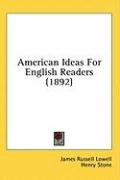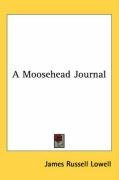Lowell James Russell
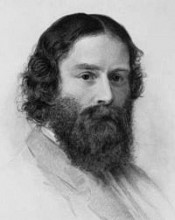
James Russell Lowell (February 22, 1819 – August 12, 1891) was an American Romantic poet, critic, editor, and diplomat. He is associated with the Fireside Poets, a group of New England writers who were among the first American poets who rivaled the popularity of British poets. These poets usually used conventional forms and meters in their poetry, making them suitable for families entertaining at their fireside. Lowell graduated from Harvard College in 1838, despite his reputation as a troublemaker, and went on to earn a law degree from Harvard Law School. He published his first collection of poetry in 1841 and married Maria White in 1844. He and his wife had several children, though only one survived past childhood. The couple soon become involved in the slavery abolition movement, with Lowell using poetry to express his anti-slavery views and taking a job in Philadelphia, Pennsylvania as the editor of an abolitionist newspaper. After moving back to Cambridge, Lowell was one of the founders of a journal called The Pioneer, which lasted only three issues. He gained notoriety in 1848 with the publication of A Fable for Critics, a book-length poem satirizing contemporary critics and poets. The same year, he published The Biglow Papers, which increased his fame. He would publish several other poetry collections and essay collections throughout his literary career. Maria White died in 1853 and Lowell accepted a professorship of languages at Harvard in 1854. He traveled to Europe before officially assuming his role in 1856; he continued to teach there for twenty years. He married his second wife, Frances Dunlap, shortly thereafter in 1857. That year Lowell also became editor of The Atlantic Monthly. It was not until 20 years later that Lowell received his first political appointment: the ambassadorship to Spain and, later, to England. He spent his last years in Cambridge, in the same estate where he was born, where he also died in 1891. Lowell believed that the poet played an important role as a prophet and critic of society. He used poetry for reform, particularly in abolitionism. However, Lowell's commitment to the anti-slavery cause wavered over the years, as did his opinion on African-Americans. Lowell attempted to emulate the true Yankee accent in the dialogue of his characters, particularly in The Biglow Papers. This depiction of the dialect, as well as Lowell's many satires, were an inspiration to writers like Mark Twain and H. L. Mencken. Nevertheless, Lowell's poetry has been criticized by many for its lack of force, its poor quality, and for being forgettable. The first of the Lowell family ancestors to come to the United States from Britain was Percival Lowle, who settled in Newbury, Massachusetts in 1639.[1] James Russell Lowell was born February 22, 1819,[2] the son of the Rev. Charles Russell Lowell, Sr. (1782–1861), a minister at a Unitarian church in Boston who had previously studied theology at Edinburgh, and Harriett Brackett Spence Lowell.[3] By the time James Russell Lowell was born, the family owned a large estate in Cambridge called Elmwood.[4] He was the youngest of six children; his older siblings were Charles, Rebecca, Mary, William, and Robert.[5] Lowell's mother built in him an appreciation for literature at an early age, especially in poetry, ballads, and tales from her native Orkney.[3] He attended school under Sophia Dana, who would later marry George Ripley, and, later, studied at a school run by a particularly harsh disciplinarian, where one of his classmates was Richard Henry Dana, Jr.[6] Beginning in 1834, at the age of 15, Lowell attended Harvard College, though he was not a good student and often got into trouble.[7] In his sophomore year alone, he was absent from required chapel attendance 14 times and from classes 56 times.[8] In his last year there, he wrote, "During Freshman year, I did nothing, during Sophomore year I did nothing, during Junior year I did nothing, and during Senior year I have thus far done nothing in the way of college studies".[7] In his senior year, he became one of the editors of Harvardiana literary magazine, to which he contributed prose and poetry that he admitted was of low quality. As he said later, "I was as great an ass as ever brayed & thought it singing".[9] Lowell was elected the poet of the class of 1838[10] and, as was tradition, was asked to recite an original poem on Class Day, the day before Commencement, on July 17, 1838.[8] Lowell, however, was suspended and not allowed to participate. Instead, his poem was printed and made available thanks to subscriptions paid by his classmates.[10] Not knowing what vocation to choose after graduating, he vacillated among business, the ministry, medicine and law. Having decided to practice law, he enrolled at the Harvard Law School in 1840 and was admitted to the bar two years later.[11] While studying law, however, he contributed poems and prose articles to various magazines. During this time, Lowell was admittedly depressed and often had suicidal thoughts. He once confided to a friend that he held a cocked pistol to his forehead and considered killing himself at the age of 20.[12] In late 1839, Lowell met Maria White through her brother William, a classmate of his at Harvard.[13] The two became engaged in the autumn of 1840; her father Abijah White, a wealthy merchant from Watertown, insisted that their wedding be postponed until Lowell had gainful employment.[14] They were finally married on December 26, 1844,[15] shortly after the groom published Conversations on the Old Poets, a collection of his previously published essays.[16] A friend described their relationship as "the very picture of a True Marriage";[17] Lowell himself believed she was made up "half of earth and more than of Heaven".[14] Like Lowell, she wrote poetry and the next twelve years of Lowell's life were deeply affected by her influence. He said his first book of poetry, A Year's Life (1841), "owes all its beauty to her", though it only sold 300 copies.[14] Her character and beliefs led her to become involved in the movements directed against intemperance and slavery. White was a member of the Boston Female Anti-Slavery Society and convinced Lowell to become an abolitionist.[18] Lowell had previously expressed anti-slavery sentiments but White urged him towards more active expression and involvement.[19] His second volume of poems, Miscellaneous Poems, expressed these anti-slavery thoughts and its 1,500 copies sold well.[20] Maria was in poor health and, thinking her lungs could heal there, the couple moved to Philadelphia shortly after their marriage.[21] In Philadelphia, he became a contributing editor for the Pennsylvania Freeman, an abolitionist newspaper.[22] In the spring of 1845, the Lowells returned to Cambridge, Massachusetts to make their home at Elmwood. They had four children, though only one survived past infancy. Their first, Blanche, was born December 31, 1845, but lived only fifteen months; Rose, born in 1849, survived only a few months as well; their only son, Walter, was born in 1850 but died in 1852.[23] Lowell was very affected by the loss of almost all of his children. His grief over the loss of his first daughter in particular was expressed in his poem "The First Snowfall" (1847).[24] Again, Lowell considered suicide, writing to a friend that he thought "of my razors and my throat and that I am a fool and a coward not to end it all at once".[23] Lowell's earliest poems were published without pay in the Southern Literary Messenger in 1840.[25] Lowell was inspired to new efforts towards self-support and joined with his friend Robert Carter in founding a literary journal, The Pioneer.[17] The periodical was characterized by most of its content being new rather than previously published elsewhere and by having very serious criticism which covered not only literature but also art and music.[26] Lowell wrote that it would "furnish the intelligent and reflecting portion of the Reading Public with a rational substitute for the enormous quantity of thrice-diluted trash, in the shape of namby-pamby love tales and sketches, which is monthly poured out to them by many of our popular Magazines".[17] William Wetmore Story noted the journal's higher taste, writing that, "it took some stand & appealled to a higher intellectual Standard than our puerile milk o watery namby-pamby Mags with which we are overrun".[27] The first issue of the journal included the first appearance of "The Tell-Tale Heart" by Edgar Allan Poe.[28] Lowell, shortly after the first issue, was treated for an eye disease in New York and, in his absence, Carter did a poor job managing the journal.[20] After three monthly numbers, beginning in January 1843, the magazine ceased publication, leaving Lowell $1,800 in debt.[28] Poe mourned the journal's demise, calling it "a most severe blow to the cause—the cause of a Pure Taste".[27] Despite the failure of The Pioneer, Lowell continued his interest in the literary world. He wrote a series on "Anti-Slavery in the United States" for the London Daily News, though it was discontinued by the editors after four articles in May 1846.[29] Lowell had published these articles anonymously, believing they would have more impact if they were not known to be the work of a committed abolitionist.[30] In the spring of 1848 he formed a connection with the National Anti-Slavery Standard of New York, agreeing to contribute weekly either a poem or a prose article. After only one year, he was asked to contribute half as often to the Standard to make room for contributions from another writer and reformer named Edmund Quincy.[31] A Fable for Critics, one of Lowell's most popular works, was published in 1848. A satire, it was published anonymously; in it, Lowell took good-natured jabs at his contemporary poets and critics. It proved popular, and the first three thousand copies sold out quickly.[32] Not all the subjects included were pleased, however. Edgar Allan Poe, who had been referred to as part genius and "two-fifths sheer fudge", reviewed the work in the Southern Literary Messenger and called it "'loose'—ill-conceived and feebly executed, as well in detail as in general... we confess some surprise at his putting forth so unpolished a performance".[33] Lowell offered the profits from the book's success, which proved relatively small, to his New York friend Charles Frederick Briggs, despite his own financial needs.[32]
do you like this author?
What readers are saying
What do you think? Write your own comment on this book!
write a commentWhat readers are saying
What do you think? Write your own comment on this author!
write a commentBook list

Poems of James Russell LowellWith biographical sketch by Nathan Haskell Dole
Series:
Unknown
Year:
Unknown
Raiting:
4.5/5
Show more
add to favoritesadd In favorites

The Writings of James Russell Lowell in Prose and Poetry,Volume VPolitical Essays
Series:
Unknown
Year:
Unknown
Raiting:
5/5
Show more
add to favoritesadd In favorites

The Vision of Sir Launfal
And Other Poems by James Russell Lowell; Edited with an Introduction and Notes by Julian W. Abernethy,Ph.D.
Series:
Unknown
Year:
Unknown
Raiting:
3.5/5
Show more
add to favoritesadd In favorites
Book list

Poems of James Russell LowellWith biographical sketch by Nathan Haskell Dole
Series:
Unknown
Year:
Unknown
Raiting:
4.5/5
Show more
add to favoritesadd In favorites

The Writings of James Russell Lowell in Prose and Poetry,Volume VPolitical Essays
Series:
Unknown
Year:
Unknown
Raiting:
5/5
Show more
add to favoritesadd In favorites

The Vision of Sir Launfal
And Other Poems by James Russell Lowell; Edited with an Introduction and Notes by Julian W. Abernethy,Ph.D.
Series:
Unknown
Year:
Unknown
Raiting:
3.5/5
Show more
add to favoritesadd In favorites

The Vision of Sir Launfal
And Other Poems by James Russell Lowell; With a Biographical Sketch and Notes,a Portrait and Other Illustrations
Series:
Unknown
Year:
Unknown
Raiting:
5/5
Show more
add to favoritesadd In favorites
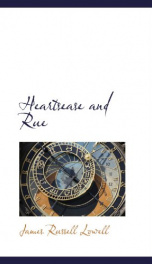
heartsease and rue
Series:
Unknown
Year:
Unknown
Raiting:
3.5/5
Purchase of this book includes free trial access to www.million-books.com where you can read more than a million books for free. This is an OCR edition with typos. Excerpt from book: TO C. F. BRADFORD ON THE GIFT OF A MEEKSCHAUM PIPE. [the pipe came safe, and welcome too, As anything must be from you; A meerschaum pure, 't would float as light As she the girls call Amphitrite. Mixture divine of foam and clay, From both it stole the best away : Its foam is such as crowns the glow Of beakers brimmed by Veuve Clicquot; Its clay is but congested lymph Jove chose to make some choicer nymph; And here combined, why, this must be The birth of some enchanted sea, Shaped to immortal form, the type And very Venus of a pipe. When high I heap it with the weed From Lethe wharf, whose potent seed Nicotia, big from Bacchus, bore And cast upon Virginia's shore, I 'l1 think, So fill the fairer bowl And wise alembic of thy soul, With herbs far-sought that shall distil, Not fumes to slacken thought and will, But bracing essences that nerve To wait, to dare, to strive, to serve. When curls the smoke in eddies soft, And hangs a shifting dream aloft, That gives and takes, though chance-designed, The impress of the dreamer's mind, I 'll think, So let the vapors bred By Passion, in the heart or head, Pass off and upward into space, Waving farewells of tenderest grace, Remembered in some happier time, To blend their beauty with my rhyme. While slowly o'er its candid bowl The color deepens (as the soul That burns in mortals leaves its trace Of bale or beauty on the face), I 'll think, So let the essence rare Of years consuming make me fair ; So, 'gainst the ills of life profuse, Steep me in some narcotic juice ; And if my soul must part with all That whiteness which we greenness call, Smooth back, O Fortune, half thy frown, And make me beautifully brown ! Dream-forger, I refill thy cup With reverie's wasteful pittance up, tO C.... --This text refers to an alternate Paperback edition.
Show more
add to favoritesadd In favorites

early prose writings of james russell lowell
Series:
Unknown
Year:
Unknown
Raiting:
2.5/5
This volume is produced from digital images created through the University of Michigan University Library's large-scale digitization efforts. The Library seeks to preserve the intellectual content of items in a manner that facilitates and promotes a variety of uses. The digital reformatting process results in an electronic version of the original text that can be both accessed online and used to create new print copies. The Library also understands and values the usefulness of print and makes reprints available to the public whenever possible. This book and hundreds of thousands of others can be found in the HathiTrust, an archive of the digitized collections of many great research libraries. For access to the University of Michigan Library's digital collections, please see http://www.lib.umich.edu and for information about the HathiTrust, please visit http://www.hathitrust.org
Show more
add to favoritesadd In favorites
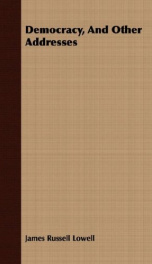
democracy and other addresses
Series:
Unknown
Year:
Unknown
Raiting:
3.5/5
MY DEAR SMAIY, -YOU heard several of these Addresses delivered, and were good enough to think better of them than I did. As this was one of my encouragements to repeat them before a larger audience, perhaps you will accept the dedication of the volume wh
Show more
add to favoritesadd In favorites
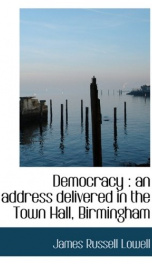
democracy an address delivered in the town hall birmingham
Series:
Unknown
Year:
Unknown
Raiting:
4.5/5
Show more
add to favoritesadd In favorites
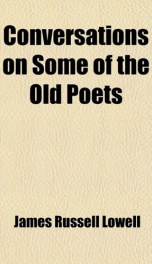
conversations on some of the old poets
Series:
Unknown
Year:
Unknown
Raiting:
4/5
Purchase of this book includes free trial access to www.million-books.com where you can read more than a million books for free. This is an OCR edition with typos. Excerpt from book: THIRD CONVERSATION. THE OLD DRAMATISTS. JOHN. I Believe it was Dr. Johnson (surely, it was no poet) who first said that all good poetry could be translated into as good prose. It is plain that he saw no distinction between the two, except in the metre and rhyme. I should judge so, at least, from his own verses. PHILIP. He meant that all poetry must be translatable into " common sense," that popular altar upon whose horns dulness and prejudice are so ready to cling. But how is Pegasus better than a dray-horse, with this market- cart trundling behind him? Doubtless, some of the truest poetry has been written without either rhyme or metre; but it has lacked one of its highest adornments, and one which the most poetical thoughts demand. Metre and rhyme are wings to the artist, and crutches to the artificer; they may lift the one to a more empyreal vantage-ground, but they will only change the natural gait of the other for a hobble. The grandest and most noble part of poetry is independent of them. Yet, wanting these, a poem shall want thecompleteness of its effect. I believe both of them to be the instinctive desires of the most amply poetical spirits. I could cite many poems which would be nothing without them, yet which have the blessed power to lead my heart into the cool stillness of memory, or to the breezy headlands of hope. John. Prose may do the same. PHILIP. Ay, but not so cheaply and simply. It is a great gift to be able to conceive and express those thoughts which entice us out of the actual into the ideal; a yet greater one, to utter such as teach us to unite the two; but, surely, that is the greatest gift of all which super- adds to these a keener and more refined delight. There are moods, too, in which pleasurable emotion is all that the mind is c...
Show more
add to favoritesadd In favorites

a fable for critics or better a glance at a few of our literary progenies fro
Series:
Unknown
Year:
Unknown
Raiting:
4.5/5
Show more
add to favoritesadd In favorites
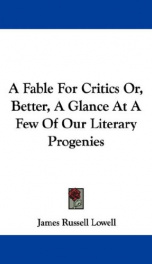
a fable for critics or better a glance at a few of our literary progenies
Series:
Unknown
Year:
Unknown
Raiting:
4/5
The Entire Title: Reader! Walk Up At Once (It Will Soon Be Too Late) And Buy At A Perfectly Ruinous Rate A Fable For Critics; Or Better (I Like, As A Thing That The Reader's First Fancy May Strike, An Old Fashioned Title Page Such As Presents A Tabular View Of The Volume's Contents) A Glance At A Few Of Our Literary Progenies From The Tub Of Diogenes; A Vocal And Musical Medley. That Is, A Series Of Jokes By A Wonderful Quiz, Who Accompanies Himself With A Rub-A-Dub-Dub, Full Of Spirit And Grace, On The Top Of The Tub. This scarce antiquarian book is included in our special Legacy Reprint Series. In the interest of creating a more extensive selection of rare historical book reprints, we have chosen to reproduce this title even though it may possibly have occasional imperfections such as missing and blurred pages, missing text, poor pictures, markings, dark backgrounds and other reproduction issues beyond our control. Because this work is culturally important, we have made it available as a part of our commitment to protecting, preserving and promoting the world's literature.
Show more
add to favoritesadd In favorites
What readers are saying
What do you think? Write your own comment on this author!
write a commentGenre
- Religion & Spirituality / Authors, A-Z / ( M ) / Moore, Thomas
- Nonfiction / Politics
- Nonfiction / Politics / General
- Books / Ibn Zabara, Joseph ben Meir,b. 1140? / Sefer sha`ashu`im
- Books / Electronic books
- Literature & Fiction
- Literature & Fiction / Poetry
- Books / American poetry
- Books / Literature / History and criticism
- Literature & Fiction / Authors, A-Z / ( P ) / Poe, Edgar Allan
if you like Lowell James Russell try:
readers also enjoyed
What readers are saying
What do you think? Write your own comment on this author!
write a commentGenre
- Religion & Spirituality / Authors, A-Z / ( M ) / Moore, Thomas
- Nonfiction / Politics
- Nonfiction / Politics / General
- Books / Ibn Zabara, Joseph ben Meir,b. 1140? / Sefer sha`ashu`im
- Books / Electronic books
- Literature & Fiction
- Literature & Fiction / Poetry
- Books / American poetry
- Books / Literature / History and criticism
- Literature & Fiction / Authors, A-Z / ( P ) / Poe, Edgar Allan
if you like Lowell James Russell try:
readers also enjoyed
Do you want to exchange books? It’s EASY!
Get registered and find other users who want to give their favourite books to good hands!
